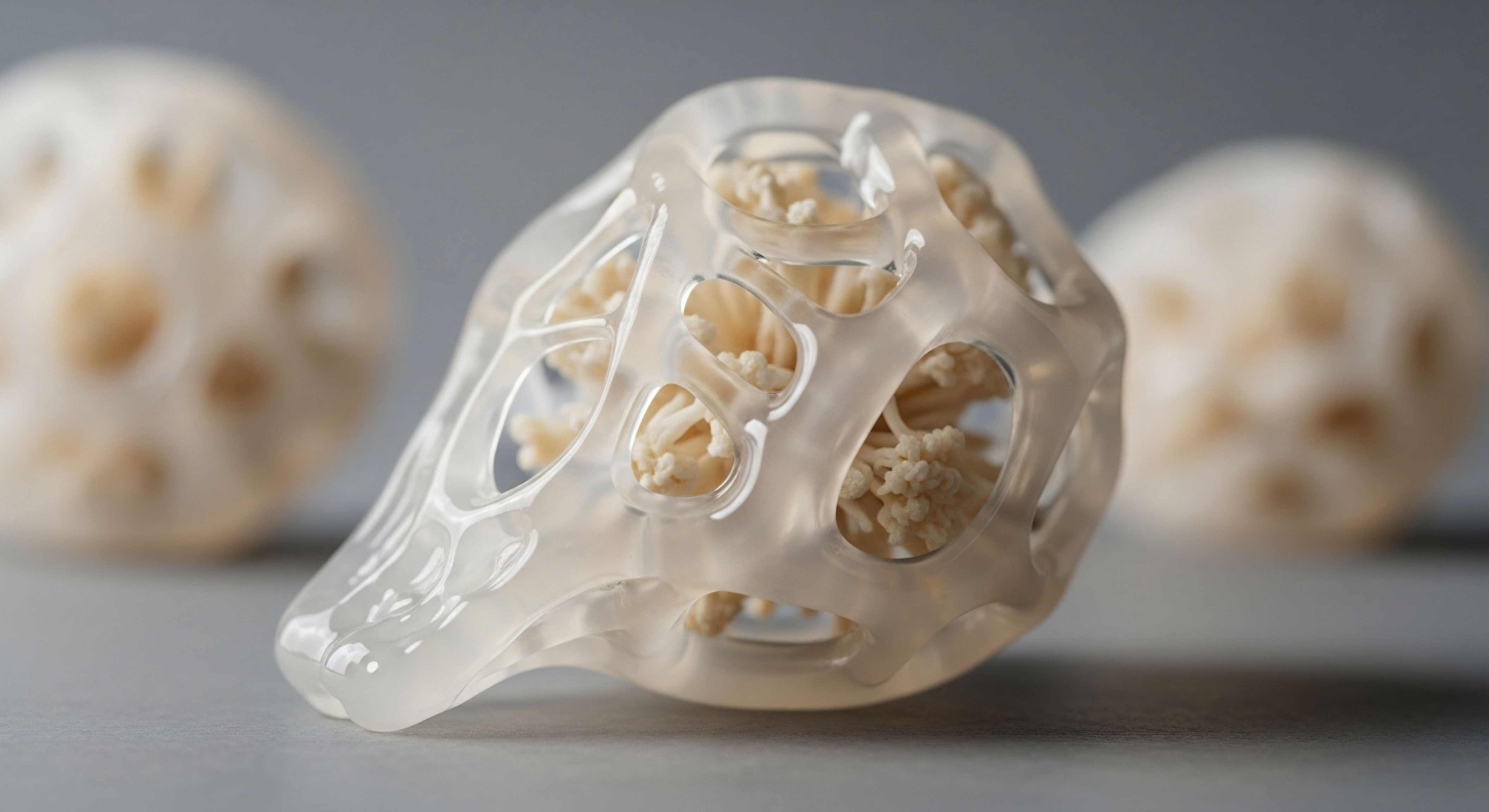

The Imperative for Biological Ascent
The pursuit of enduring vitality marks a defining characteristic of human ambition. A deep understanding of our internal chemistry reveals a truth ∞ the body functions as a complex, adaptive system, capable of profound optimization. We stand at a unique juncture, equipped with the scientific instruments to transcend traditional notions of aging and performance. This is an invitation to engage with a new paradigm, one where proactive biological stewardship unlocks capabilities previously confined to aspiration.
Decades of passive acceptance regarding age-related decline now yield to a sophisticated, data-driven approach. The diminishing returns of chronological years need not dictate a decline in cognitive acuity, physical prowess, or metabolic efficiency. Scientific inquiry has unveiled the intricate feedback loops governing our physiology, offering precise points of intervention for systemic recalibration. This knowledge empowers individuals to author a new biological narrative.

Hormonal Drift ∞ A Silent Erosion
Our endocrine system, a symphony of glands and signaling molecules, orchestrates nearly every aspect of human function. Hormones govern energy, mood, body composition, and cognitive performance. A natural decline in critical hormone levels marks the passage of time. Testosterone levels, for example, begin a gradual descent for men around age 30, influencing muscle mass, energy, and mood.
This hormonal drift extends to women, where declining estradiol levels correlate with shifts in cognitive performance and memory. The effects are subtle at first, accumulating over years into a noticeable erosion of peak function.
This decline extends beyond subjective feelings. Reduced hormonal output directly correlates with diminished athletic performance and altered physiological responses to stress. The body’s capacity for recovery, adaptation, and sustained output becomes compromised. Identifying these shifts through rigorous biomarker analysis represents the first step in reclaiming a more robust physiological state.
Research indicates that men undergoing Testosterone Replacement Therapy (TRT) experience enhancements in spatial memory and executive function, highlighting the hormone’s critical role in cognitive health.

Metabolic Architecture ∞ Fueling Longevity
Metabolic health underpins all vitality. It describes the body’s efficiency in converting food into energy and maintaining optimal organ function. A robust metabolism supports sustained energy levels, clear cognitive function, and resilience against disease. Disturbingly, only a small fraction of adults currently exhibit optimal metabolic health. This widespread metabolic dysregulation contributes significantly to the modern health crisis.
Key biomarkers define metabolic health ∞ blood sugar levels, triglycerides, high-density lipoprotein (HDL) cholesterol, blood pressure, and waist circumference. Optimal ranges across these markers signify a body operating with precision, efficiently managing energy substrates and mitigating inflammatory responses. Deviations from these optimal parameters signal systemic stress, hindering peak performance and accelerating biological aging. A deliberate focus on metabolic architecture lays the foundation for enduring health and peak output.

The Performance Deficit ∞ Beyond Chronological Years
The cumulative impact of hormonal drift and metabolic inefficiency creates a measurable performance deficit. This deficit extends across physical, mental, and emotional domains. Cognitive challenges, memory issues, and slower mental processing frequently accompany lower testosterone levels. Physical strength, endurance, and recovery capacity also diminish, compromising an individual’s ability to maintain a high-performance lifestyle.
Accepting this decline as an inevitable consequence of aging misunderstands biological potential. Modern science offers a path to recalibrate these systems, moving beyond symptom management to address root causes. The aspiration involves not simply slowing decline, but actively restoring and optimizing physiological parameters for a life lived at full capacity.


Orchestrating Internal Chemistry
The journey to enduring vitality involves a precise, scientific approach to internal chemistry. This is a deliberate process of systems-level engineering, where targeted interventions recalibrate the body’s most fundamental operations. The methodology combines the rigor of clinical science with the strategic foresight of an elite performance coach, guiding individuals toward a state of optimized function.

Endocrine System Restoration
Hormone optimization stands as a cornerstone of biological recalibration. Tailored interventions, such as Testosterone Replacement Therapy (TRT) for men, directly address the decline in endogenous hormone production. TRT enhances verbal and working memory, sharpens focus, and improves attention in individuals experiencing testosterone deficiency. This intervention extends beyond physical attributes, supporting neurotransmitter regulation, increasing cerebral blood flow, and providing neuroprotection.
For women, carefully considered estradiol therapy can positively influence cognitive performance, particularly episodic and prospective memory. The precise delivery method, whether transdermal or oral, holds significance for distinct cognitive benefits. These protocols require meticulous monitoring and individualization, ensuring optimal physiological balance and maximal benefit.

Peptide Science ∞ Cellular Instruction
Peptide therapy represents a frontier in targeted biological optimization. Peptides, small chains of amino acids, function as intelligent signaling molecules within the body. They bind to specific cellular receptors, initiating precise cascades of biological responses. These responses range from stimulating tissue repair and modulating immune function to influencing gene expression and promoting cellular regeneration.
- BPC-157 ∞ This peptide demonstrates significant capacity for tissue healing, accelerating recovery from injuries involving muscles, tendons, and ligaments. It stimulates blood vessel formation and collagen production, supporting rapid repair.
- Growth Hormone Secretagogues (GHS) ∞ Compounds like capromorelin and MK-677 restore growth hormone and IGF-1 levels to those typically observed in younger adults. This leads to increases in lean body mass, favorable fat redistribution, and improvements in physical capabilities such as walking speed and stair climbing.
- GHK-Cu ∞ This peptide supports skin health, collagen production, and exhibits antioxidant properties, contributing to healthier skin.
Peptides offer a highly specific means of delivering new instructions to cellular architects, providing superior raw materials for systemic upgrades. Their precision minimizes systemic impact, concentrating benefits where they are most needed.
Growth Hormone Secretagogues can restore GH and IGF-1 levels in older adults to those observed in 20- to 30-year-old subjects, leading to increases in fat-free mass and improved physical function.

Metabolic Refinement Strategies
Achieving metabolic mastery involves a multi-pronged strategy. This includes advanced nutritional frameworks, precisely timed exercise regimens, and optimized sleep protocols. Monitoring key biomarkers provides actionable intelligence for these adjustments. Maintaining stable blood glucose levels, for example, extends beyond dietary choices, encompassing sleep quality and stress management.
Strategic metabolic interventions aim to:
- Optimize insulin sensitivity, preventing energy dysregulation.
- Balance lipid profiles, supporting cardiovascular and cellular health.
- Regulate blood pressure, ensuring optimal circulatory function.
- Maintain ideal body composition, minimizing visceral fat accumulation.
These strategies collectively transform the body’s internal engine, enhancing its efficiency and resilience. They represent a commitment to biological excellence, moving beyond basic health maintenance to active, continuous optimization.


The Continuum of Peak Performance
The implementation of scientific recalibration protocols marks a strategic decision for enduring performance. This is not a finite project, but an ongoing commitment to a state of optimized existence. Understanding the optimal timing for intervention and the measurable markers of progress defines this advanced approach to vitality.

The Optimal Intervention Window
The ideal time for biological recalibration begins not at the onset of severe decline, but proactively, as early indicators of hormonal or metabolic shifts appear. Waiting until overt symptoms manifest compromises the potential for complete restoration. Early intervention allows for the subtle tuning of physiological systems, preventing the cascade of age-related degradation. For example, addressing testosterone decline as it begins, rather than decades later, yields more profound and sustained cognitive and physical benefits.
This proactive stance positions individuals at the forefront of their biological destiny. It represents a conscious decision to pre-empt decline, maintaining a performance edge throughout life’s transitions. The science supports this early, decisive action, translating into a greater capacity for sustained high-level function.

Measuring Progress ∞ Biomarker Imperatives
Quantifiable data drives every aspect of the Vitality Architect’s methodology. Progress relies on rigorous biomarker tracking, moving beyond subjective feelings to objective validation. Regular assessment of endocrine panels, metabolic markers, and advanced inflammatory indicators provides a clear roadmap of internal health. These measurements serve as feedback loops, guiding adjustments to protocols and ensuring continuous optimization.
For example, monitoring IGF-1 levels in response to GHS therapy provides direct evidence of growth hormone axis restoration. Tracking cognitive function through validated assessments complements subjective reports of improved focus and memory. This data-informed perspective ensures that interventions are effective, precise, and aligned with individual biological responses.

Sustaining the Optimized Human System
Achieving an optimized state involves continuous refinement. Sustaining peak performance demands vigilance and adaptation. Biological systems are dynamic, responding to environmental inputs, lifestyle choices, and the subtle passage of time. Regular reassessment, coupled with an agile approach to protocol adjustments, ensures the enduring efficacy of recalibration efforts.
This involves a commitment to a lifestyle that reinforces biological advantages. Optimized nutrition, strategic exercise, restorative sleep, and effective stress mitigation become integrated components of daily existence. The ultimate goal involves embedding these principles into a resilient, high-performance daily rhythm, creating a self-sustaining cycle of enduring vitality.

The Evolved Human Paradigm
The era of passively observing biological decline concludes. We stand on the precipice of a new human condition, one defined by proactive mastery over our internal systems. The Scientific Recalibration for Enduring Vitality is more than a collection of protocols; it is a philosophy, a declaration of intent. It affirms that human potential is not a fixed ceiling but a horizon that continually expands with knowledge and application.
This pursuit represents a personal investment in the most sophisticated technology available ∞ the human body itself. It is about understanding the engineering, mastering the chemistry, and then deliberately orchestrating a life of unparalleled vigor and clarity. This path requires dedication, an openness to scientific discovery, and an unwavering belief in the capacity for self-improvement.
The rewards extend beyond individual longevity, influencing the very quality of our experience, allowing us to operate at a higher echelon of existence, truly defining what it means to live with enduring vitality.



